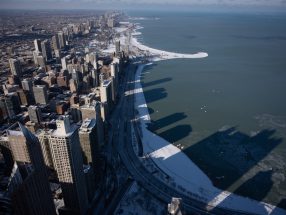
DOWNTOWN — A proposed bill would pave the way for speed cameras on DuSable Lake Shore Drive, aiming to prevent reckless driving in high-crash areas.
But first, state officials want to study how advanced AI-driven traffic cameras could impact driver behavior and safety on one of Chicago’s busiest roadways.
The proposed legislation, sponsored by Illinois Sen. Sara Feigenholtz, would allow speed cameras to be installed along DuSable Lake Shore Drive if a forthcoming study finds they improve safety in high-crash areas.
Currently, speed cameras are only permitted near schools and parks. Expanding that definition would mark a major shift in the city’s enforcement strategies and could change how officials tackle speeding and reckless driving on major roadways beyond just Lake Shore Drive.
If that happens, drivers could be ticketed for going 6 mph or more over the speed limit, with fines starting at $50 and going up to $100 for higher speeds.

The impetus of Feigenholtz’s proposed bill stemmed from a community meeting she attended a few years ago where she was shown “alarming” footage and photos of drivers crashing into each other at high speeds, particularly at the southbound entrance at DuSable Lake Shore Drive and North Avenue.
While Feigenholtz had long heard complaints from constituents about speeding and noise, seeing the crash footage firsthand reinforced the urgency of addressing the issue.
After consulting with the Chicago Department of Transportation and local officials, Feigenholtz was told some of her safety concerns would be addressed through the Redefine the Drive project. But she wasn’t convinced that the project would go far enough to fix the problem, she said.
Redefine the Drive is a comprehensive initiative led by the state and city departments of transportation to overhaul a 7-mile stretch of North DuSable Lake Shore Drive between Grand and Hollywood avenues.
The project’s objectives include enhancing safety, improving mobility, addressing infrastructure deficiencies and expanding access to Chicago’s lakefront.
However, the initiative has faced criticism from local officials and advocacy groups. A significant concern is the absence of dedicated bus-only express lanes in the current proposal. Critics argue that without prioritizing public transit, pedestrian and other forms of accessibility, the plan may not effectively address congestion or promote sustainable transportation options.

And safety remains a pressing issue, Feigenholtz said.
Between 2019 and 2023, 64 percent of fatal traffic crashes in Feigenholtz’s district occurred on Lake Shore Drive.
Despite making up less than 0.5 percent of the city’s roadway network and just 2.5 percent of all crashes citywide, Lake Shore Drive is responsible for nearly 7 percent of all traffic fatalities from 2019 to 2024, according to city crash data.
The legislation Feigenholtz is introducing would tap the Urban Transportation Center at University of Illinois Chicago to study how new random AI traffic camera technology could change driving behavior and reduce crashes.
The idea to use AI traffic cameras was partly inspired by technologies being used in Europe, Feigenholtz said.
“I think this is the perfect time to get a study like this going,” Feigenholtz said. “It’s a chance to bring in more innovation and find solutions that prioritize safety, not just revenue.”
Feigenholtz’s bill is on the docket for the senate Executive Committee Thursday afternoon.
Support Local News!
Subscribe to Block Club Chicago, an independent, 501(c)(3), journalist-run newsroom. Every dime we make funds reporting from Chicago’s neighborhoods. Already subscribe? Click here to gift a subscription, or you can support Block Club with a tax-deductible donation.
Listen to the Block Club Chicago podcast:


